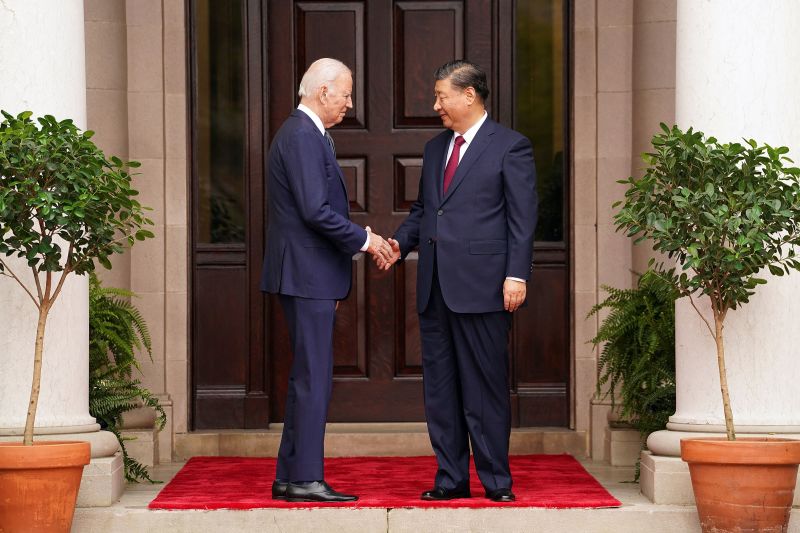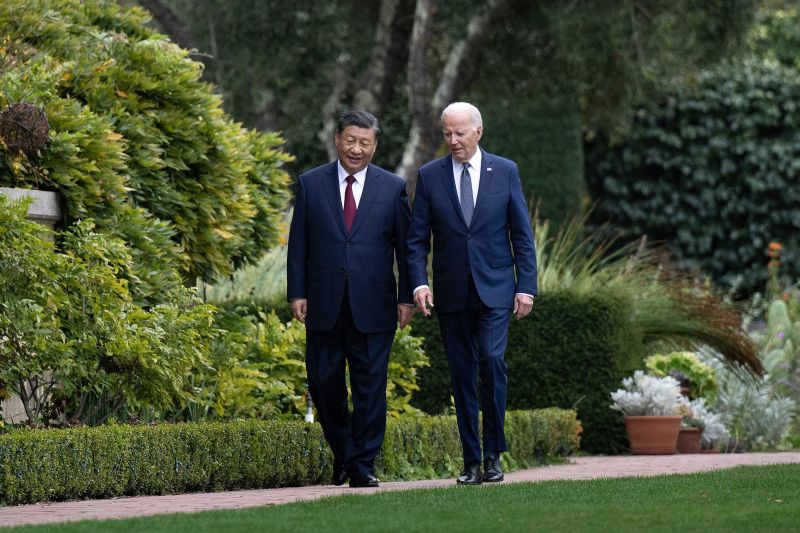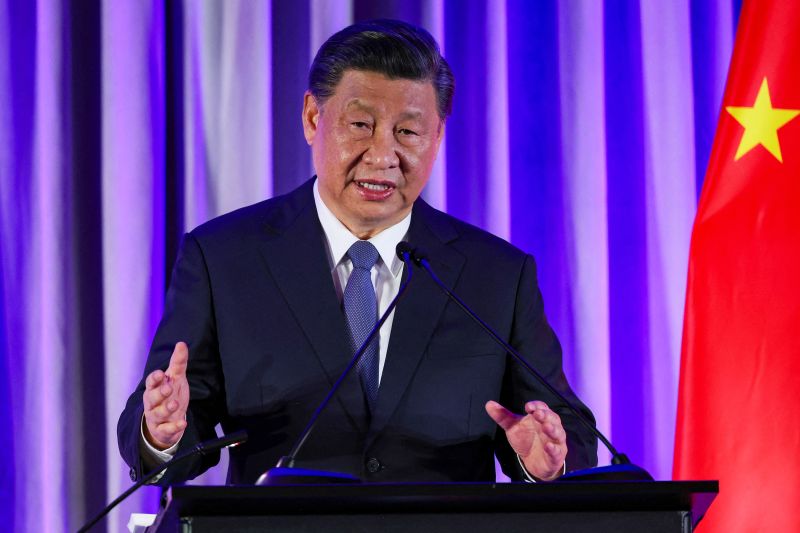
Xi's Shifting Tone on US: Can it Endure After Biden's Dictator Remark?

Xi Jinping signals a significant change in China's approach towards the US, aiming to enhance bilateral ties This landmark meeting with President Joe Biden reflects Beijing's efforts to minimize tensions and foster a more amicable relationship
Chinese President Xi Jinping and US President Joe Biden met on Wednesday, signaling a positive change in China's attitude towards building better relations with the United States. This shift in tone from Beijing aims to reduce tensions between the two countries.
The durability of this shift in the contentious relationship will face an immediate test based on Biden's comments in a solo press conference following the meeting. During the conference, the President restated his belief that Xi is a "dictator," in response to a reporter's question about his previous statement made in June. Beijing reacted strongly to this, perceiving the remark as undermining the tentative progress made in dialogue between the two parties after a visit from US Secretary of State Antony Blinken.
At a Chinese Foreign Ministry briefing on Thursday, when questioned about Biden's recent statement, a spokesperson unequivocally denounced it as "highly incorrect" and an "irresponsible political ploy that China firmly opposes." Mao Ning, the spokesperson, emphasized the presence of individuals with hidden agendas who seek to destabilize China-US relations, but assured that their efforts will ultimately fail.
It remains uncertain if there will be any additional response this time, but China's recent signals regarding the meeting between Xi and Biden in the San Francisco Bay Area indicate a departure from their previous hardline stance towards the United States. This change coincides with China's struggles in its economy and its eagerness to showcase Xi as a strong and capable global leader.
As stated on Wednesday by both the US and China, after several hours of "constructive" discussions, the two parties have agreed to reinstate military communications and work together to combat the flow of fentanyl from China to the US.
China described the negotiations as "positive" and "comprehensive," underscoring President Xi's commitment to clarify Beijing's non-negotiables, including its stance on Taiwan and perceived American attempts to restrain China's ascent.
Xis optics
On Chinese state media and various social media platforms, the hashtag #Planet-Earth-Is-Big-Enough-For-Both-China-And-The-US gained popularity, indicating a generally positive reaction.
Chinese state broadcaster CCTV emphasized Biden's invitation for Xi to take a stroll around the green estate where the meeting occurred. Additionally, it was noted that the American leader personally accompanied Xi to his car as a farewell gesture, which was also highlighted in another popular hashtag on Chinese social media.
The event received favorable coverage, which was a departure from the usual criticism of the US that is frequently seen on Chinese state and social media. The growth of Chinese nationalism has been fueled by anti-US rhetoric, which has become a prominent theme following the escalation of tensions between the two countries in recent years.
On November 15, 2023, in Woodside, California, US President Joe Biden and Chinese President Xi Jinping exchange handshakes during the Asia-Pacific Economic Cooperation (APEC) summit.
Biden commends fruitful discussions with Xi, resulting in agreements on fentanyl and military communication. The visual representation of a cordial reception and Xi's authoritative presence next to Biden hold significant value, according to analysts. They suggest that Xi not only aimed to stabilize the complex relationship during a period of economic vulnerability but also portray his adept management of China's foreign affairs to his domestic audience.
Xi's visit coincided with a time of difficulty for the Chinese economy, marked by a property market crisis, significant local government debt, and a concerning level of youth unemployment. Additionally, stringent measures implemented in various sectors have profoundly impacted business confidence, raising doubts about the available opportunities in China.
Alfred Wu, an associate professor at the Lee Kuan Yew School of Public Policy in Singapore, recognized the enormity of these challenges. He emphasized that Xi's visit to California aimed to showcase his competence in international affairs to the Chinese audience. Furthermore, Wu highlighted Xi's high standing in America and his recognition as a global leader on par with Biden.
The press conference with China's Foreign Minister Wang Yi in California after the bilateral meeting also highlighted some of these visual aspects.
Wang mentioned that Biden extended a "distinct invitation to President Xi Jinping, specifically for a meeting of heads of state," in contrast to the bilateral meeting arrangements taking place during the Asia-Pacific Economic Cooperation (APEC) forum, which Xi and other leaders from the Pacific Rim are in town to participate in.
Wang emphasized that the Xi-Biden meeting is undoubtedly a significant occurrence in today's international relations, serving as a milestone. He highlighted that the four-hour direct discussions took place during a crucial period in China-US relations.
Furthermore, during a dinner gathering with American CEOs, Xi adopted a conciliatory approach in his speech.
Xi addressed the audience, emphasizing that the key determining factor in US-China relations is whether they perceive each other as rivals or partners. He stated that perceiving one another as fierce competitors, as a major geopolitical obstacle, and as a constant imminent danger will inevitably result in misguided policies, actions, and outcomes. Amongst the audience were prominent individuals such as Apple CEO Tim Cook and Tesla founder Elon Musk.
"China is willing to be a partner and friend of the United States," he added.
US President Joe Biden and Chinese leader Xi Jinping walk together during their bilateral meeting.
Brendan Smialowski/AFP/Getty Images
Even as it facilitated the progress of dialogue and collaboration, the meeting also provided an opportunity for both parties to emphasize their disparities and demonstrate areas where agreement was not achieved, which experts assert will persist in defining their contentious relationship.
Bottom lines
In Taiwan, the self-governing democracy claimed by China's ruling Communist Party, Xi called on the US to cease arming the island and to back China's "peaceful reunification," as stated in the readout of the meeting released by Chinese state media. Xi emphasized that China will ultimately and inevitably achieve reunification, a sentiment that garnered significant attention on Chinese social media.
Biden reiterated the enduring American stance on Taiwan and its objection to any independent modifications to the existing situation. He emphasized the necessity for resolving issues between the two sides of the Taiwan Strait through peaceful methods. Xi urged the US to refrain from plotting to suppress or restrict China, possibly alluding to America's efforts to strengthen alliances in Asia and impose trade and investment limitations on advanced technology. The United States argues that these restrictions are aimed at safeguarding its national security in the face of an assertive and authoritarian China.
On November 15, 2023, Xi Jinping, the leader of China, addressed attendees at a dinner event organized by the National Committee on US-China Relations and the US-China Business Council. The occasion took place during the APEC summit in San Francisco.
Carlos Barria/Pool/Reuters
China is willing to be a partner and friend of the US, Xi tells American CEOs
"Both parties need to comprehend the principles and boundaries of one another," emphasized Xi.
The profound apprehensions held by each party regarding the intentions of the other are unlikely to be assuaged by a single meeting. The manner in which these agreements are implemented in the ensuing weeks and months will speak volumes about the long-term commitment of both China and the US towards fostering enduring stability.
Liu Dongshu, an assistant professor specializing in Chinese politics at City University of Hong Kong, affirms that the recent meeting suggests that the US-China relationship will not deteriorate further in the coming year. However, he believes that a rapid rebound leading to significantly warmer relations is unlikely. According to Liu, although Xi Jinping desires improved ties with the US, Beijing recognizes the fundamental reality that the US aims to constrain China. Therefore, while Beijing prefers warmer relations, they are willing to accept the status quo as long as the situation does not worsen.
One way to gauge the progress of relations is by observing Beijing's response to Biden's "dictator" comment. It remains to be seen whether Beijing's state media and social media platforms will downplay the comment and instead emphasize the positive outcomes of Wednesday. Biden himself appears optimistic that the two sides can mediate their differences, acknowledging that Xi is a dictator in the sense that he leads a communist country and highlighting the stark contrast between the Chinese and American governments.
"Anyway," he added. "We made progress."
CNNs Mengchen Zhang and Nectar Gan contributed to this report.
















